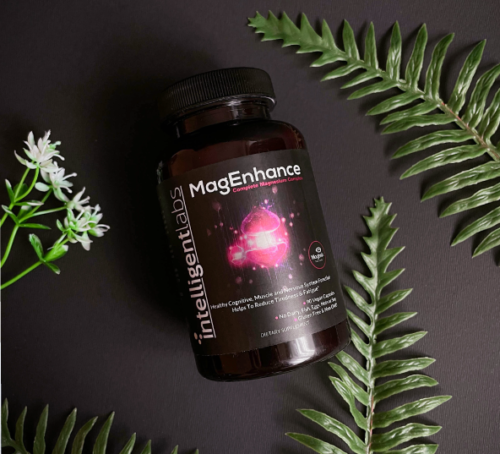In some cultures, napping in the middle of the day is frowned upon. You’re supposed to sleep and recharge your batteries solely in the evening. Naps are considered counterproductive, but you know what? Quick naps aren’t all that bad. In fact, the opposite may very well be true!
So, let’s answer that all-important question, shall we? Are naps good for you or can they possibly harm your health? And also, can our MagEnhance Triple Magnesium Complex help you finally get a good night’s sleep? Find out below!
Table of Contents
Napping is not just for dogs and children…
Some of the world’s most influential thinkers and leaders have catnapped every day. Albert Einstein, Winston Churchill, Salvador Dali, John F Kennedy, and Calvin Coolidge all found that a short snooze left them refreshed, recharged, and ready to work. Science confirms that napping can help beat the post-lunch slump and boost cognitive performance. But now there is evidence that a siesta could also save your life.
You probably don’t need me to tell you that a nap can make you feel better, more alert, sharper and less grumpy. Research has shown that naps can improve our problem-solving abilities and our memories. Naps can also enhance perceptive skills and speed up reaction times. But the benefits go way beyond that.
Short daytime periods of sleep have been shown to be good for the heart, decrease blood pressure, help our bodies cope with stress and even help us battle the bulge.
Naps and the heart
Regular naps have been shown to reduce the risk of heart disease. Those who have a siesta at least three times a week were shown in research to be more than a third less likely to die of cardiovascular disease. (1)
A leading scientist from the extensive study, Dimitrios Trichopoulos of the Harvard School of Public Health in Boston said:
“Taking a nap could turn out to be an important weapon in the fight against coronary mortality.”
The effect proved to be particularly strong for working men. Those who regularly took a little time out from their working day to have a short snooze had a 64% lower risk of death from heart disease. However, even non-workers showed a benefit. Those occasionally napping had a 12% lower coronary mortality rate and those who systematically napped had a 37% reduction in death from cardiovascular events.
Naps and stress
We’ve all been there… after a few late nights, it can be difficult to deal with the stresses and strains of the working day. Little problems suddenly seem insurmountable. It’s not just our minds that struggle when we’re sleep-deprived, our bodies suffer too.

When we’re under psychological pressure, the body releases chemicals designed to help us fight or flee. When we’re tired, even more of these stress hormones flood through the body. That was great when we were cavemen fighting saber-toothed tigers. But in the modern world, when stress is sustained and psychological, the results are potentially deadly. The hormones can ramp up blood pressure and blood sugar levels predisposing to diabetes, cardiovascular disease, and obesity.
The good news is that research shows that naps can mitigate the effects of too little sleep, decrease the release of these stress chemicals, and help protect our bodies from the negative effects of stress. (2)
So, if naps are good for you, why are many of us so embarrassed or ashamed of it? I mean, let’s face it, whether it’s called a siesta, riposo, or inemuri, an afternoon snooze is ingrained into many cultures. But in the US, the UK, and many other Western societies, sleeping in the daytime can be seen as laziness, a sign of getting old or lacking drive. With 650,000 Americans dying of heart disease every year, maybe it’s time to change the way we think and the way we work.
Related article: Which Magnesium Is Best for Sleep?
How to have the perfect power nap
At this point, we’ve answered the question, “Are naps good for you?” Now it’s time to share some tips on how to get the perfect mid-day snooze:
Keep it consistent
Try to nap at the same time every day. This helps your body adjust its normal circadian rhythms and ensures you get maximum benefit. Schedule it in your diary and make it a regular part of your daily routine.
Sleep or stimulants?
Do you slug back a strong cup of coffee to beat that post-lunch slump? If you do, you may not be taking the best approach. A study compared the effectiveness of caffeine, daytime naps and getting more night-time sleep as ways of overcoming the afternoon dip. And the winner? Naps won hands down (3).
Don’t worry, you don’t have to bin the Java. Both napping aficionados and scientific researchers at Loughborough University recommend having a cup of coffee immediately before your nap. When you wake twenty minutes later, the caffeine will have kicked in so that you get a double boost (4).
It’s all about the adenosine. Adenosine is the chemical responsible for our feelings of tiredness, it slows down nerve cell activity making us sluggish and slow. Adenosine levels naturally decrease when we snooze, and caffeine blocks our body’s response to the chemical – so together you have the ultimate power nap.
Afternoon delight
Most of us start to flag between 1 and 4 pm. It’s the result of our in-built body clock and the build-up of adenosine. Stop the slump by scheduling a short snooze after lunch.

Short is sweet
Do you wake up from a nap groggy, confused, and fit for nothing but rolling over and going back to sleep? If you do, you may be sleeping for too long. Avoid this “sleep inertia” by setting an alarm and aiming for no more than 20 to 30 minutes max.
Turn off the lights
Our bodies are programmed to respond to darkness and light. Flicking the switch or using an eye-mask will help you doze off and plenty of bright light will re-energize you when you’re awake.
Cover up
When we sleep, our metabolism slows down and our body temperature drops. A light blanket or an extra sweater will help you stay comfortable.
While you’re waiting for the culture at work to catch up with medical research, it’s still possible to enjoy a siesta and avoid getting fired. Try snoozing in the car, under your desk, or even in a stationery cupboard during your lunch hour.
What do you think? Are naps good for you?
Napping could improve your work performance, your health, and your well-being. So, what are you waiting for? Remember, it’s not laziness, it’s a way of rebooting your system so that it is better able to cope with challenges. If you find your eyelids drooping when the clock ticks past midday, make like Coolidge and Kennedy and catch some ZZZZs.





